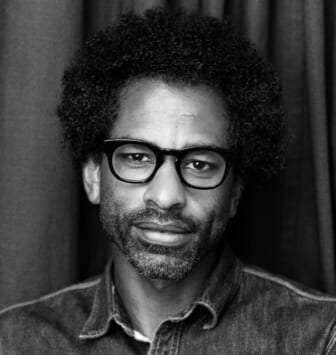A generational clash in the film ‘Tár’ mirrors our own national discourse about separating art from a problematic artist
OPINION: In the film "Tár," a young, BIPOC, pangender person's values collide with those of a successful Gen X lesbian played by Cate Blanchett. At the heart of their debate is a question: Do we have to reject the art of people who’ve done horrible things?

Editor’s note: The following article is an op-ed, and the views expressed are the author’s own. Read more opinions on theGrio.
One of the most unforgettable scenes of the year in cinema boils down to two people talking, but their conversation, their intense argument, is so deeply symbolic of where we are right now in culture and society that I couldn’t stop thinking about the scene and what it says about us.
The film is the brilliant “Tár,” the story of the life of Lydia Tár, a classical music composer who is hailed as a genius. (There are no spoilers in this essay.) Tár, as played by the incomparable Cate Blanchett, is a force of nature who can take over any room. She is filled with great thoughts, but she can also be self-important, pretentious, obnoxious and worse. She is an Incredibly Successful Person who lets us know early on that she doesn’t wish to be seen a female conductor. She’s just a conductor. That, of course, is a notion that some people could never accept.
Early on in the film, Tár is at Julliard, the legendary music school, teaching a class on conducting, and things go off the rails. Tár’s foil in this scene is Max (played by newcomer Zethpan Smith-Gneist), a conducting student who’s Black (or perhaps biracial), tall, shy and, yet, very sure of himself. Max’s leg shakes throughout the scene because he’s filled with nervous energy being so close to this musical giant, but his views are unshakeable no matter how hard Tár tries to change them. Max, who calls himself BIPOC and pangender, is either one of the last of the millennials or one of the oldest of the zoomers, and some may feel like he’s close to being a parody of woke culture, but to me, he’s just one of the youngs who are out to remake the world in the way they think it should be, and standing strong against the intellectual onslaught of one of the olds — Tár, a white Gen X lesbian.
In the scene, Tár is talking about the music of Johann Sebastian Bach in rapturous terms. He is, to her, one of the greatest composers of all time, but when she asks Max about him, he says he’s never even listened to him, rejecting her icon out of hand. “I’m not into Bach,” he says, dismissing the giant as if he were nothing. Tár, shocked by this, asks why. His answer: “I would say Bach’s misogynistic life makes it impossible for me to take his music seriously.” He references Bach having sired over 20 children and then reduces Bach even more — “White male composers are just not my thing.”
Tár, hearing this, almost loses it. The focus of her entire life is music so, naturally, her response is what does Bach’s life have to do with his music?
And with that, they are at a stalemate, which mirrors so much of the national and intergenerational conversation going on in America in recent years. Can we talk about art without talking about the artist? Is there a piece of art so important, totemic and iconic that it doesn’t matter what the creators did with their lives? Are there crimes large enough to necessitate the virtual erasure of art no matter how important it is? Do we have to reject the art of people who’ve done horrible things? What divides bad behavior we can overlook from behavior that merits cancellation? And who decides? And what about …
Sometimes these questions seem easy. R. Kelly was convicted after years of sex trafficking. Can you still listen to his music? I can’t. Bill Cosby was convicted of sexual assault. (His conviction was overturned, but he was not exonerated.) Can you still laugh at his jokes? What about Michael Jackson? Many believe his numerous accusers, but many of his fans don’t. What do we do with his music? What about Kanye? His bizarre antisemitic and pro-Hitler comments are disgusting and deplorable, but besides Kelly, Cosby and Jackson, his crimes pale in comparison. But many people have canceled him. Yet some people continue wearing his shoes and listening to his music so …
We as a society have not yet decided whether we truly can or should separate the art from the artist and where the line falls. In 1973, when Marvin Gaye was 34, he met 17-year-old Janis Hunter. She gave birth to his daughter in 1974 and later became his wife. James Brown beat up his wife. Miles Davis, too. Do we cancel them, too? It feels like we as a society haven’t decided.
Where you stand on these questions may rest on how old you are and how important these artists are to you and how you feel about their crimes. There are people who feel like Lydia Tár is absolutely right to focus like a laser on the music because what Bach did to women has nothing to do with his writing. There are others who feel like Max is absolutely right to demand icons who are worthy of veneration in all aspects of their life and also right to demand icons who look more like him or at least aren’t more of the dead white men that the academy feeds him.
Tár’s retort to Max’s rejection of Bach is to say what if the world views you through the lens that you view Bach? What if people reduce you to just someone who’s Black and pangender? To which Max could have responded, “I am judged as and reduced to my demographics all the time or at least in those times when my demographics allow me to be seen at all. My struggle is first to be viewed at all and second to be viewed as more than that. It’s only white people who truly get to be seen as people without extra adjectives. Part of what I want to do is to take the veneration of white people down a few pegs by saying where are the Black composers? Where are the female composers? Can we listen to them? They make me feel seen in a way that these old white men never could. These old white men we listen to while giving them a free pass for their transgressions sound to me like oppression.”
I feel like I have a version of this argument all the time with the youngs. Jay-Z, to me, is the greatest MC of all time but sometimes on Twitter, millennials dismiss his flows, his diction, his voice and his triple entendres by saying stuff like, “Nah, I don’t like him. He cheated on Beyoncé.” Oh. I feel like Quentin Tárantino is possibly the greatest filmmaker of his generation but if I say that in a room full of Black folks, many of them will dismiss him completely because his films employ the n-word so much. Oh. I love the work of Jordan Peele and Donald Glover, but some dismiss them because they married white women. Oh. I’m all for tearing down some things — yes, let’s get rid of the statues of the slaveholders who are beloved for having built this nation — but I don’t want to get rid of Pablo Picasso because he had troubling relationships with some of the women he dated. But I’m sure that if I walked into the right classroom or the right coffee shop, I could find a Max who’s already erased Picasso and Jay-Z and Tárantino from their own personal canon. We as a society have not decided on the answers to these questions, and we’re working it out on a person-by-person basis and walking down a rather chaotic road.

Touré is a host and Creative Director at theGrio. He is the host of the podcast “Toure Show” and the podcast docuseries “Who Was Prince?” He is also the author of seven books including the Prince biography Nothing Compares 2 U and the ebook The Ivy League Counterfeiter. Look out for his upcoming podcast Being Black In the 80s.
TheGrio is FREE on your TV via Apple TV, Amazon Fire, Roku, and Android TV. Please download theGrio mobile apps today!


